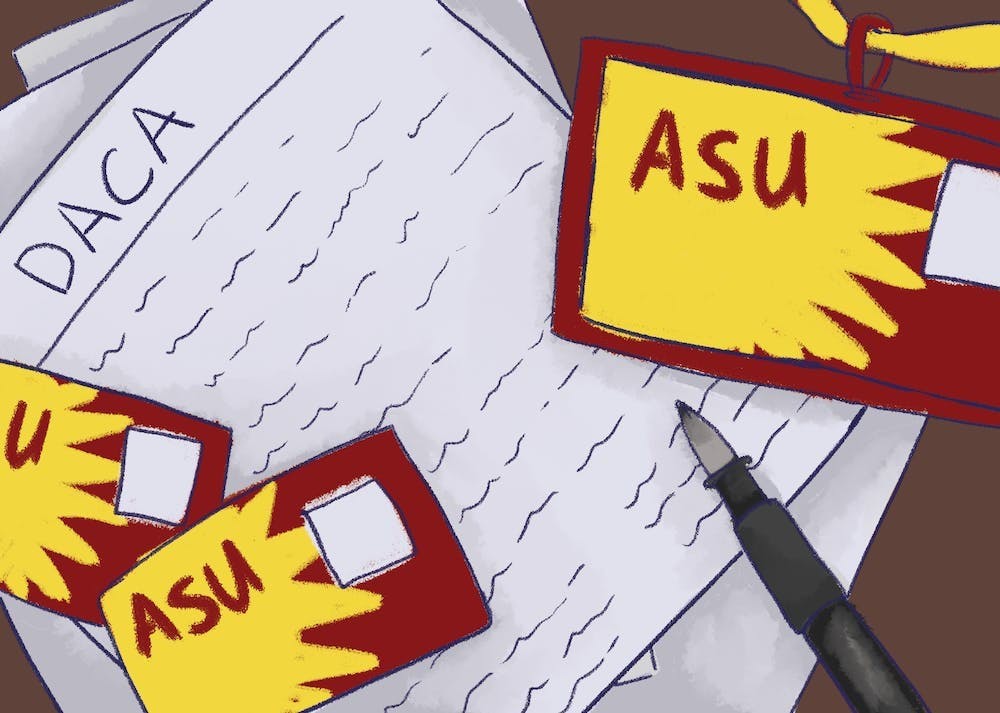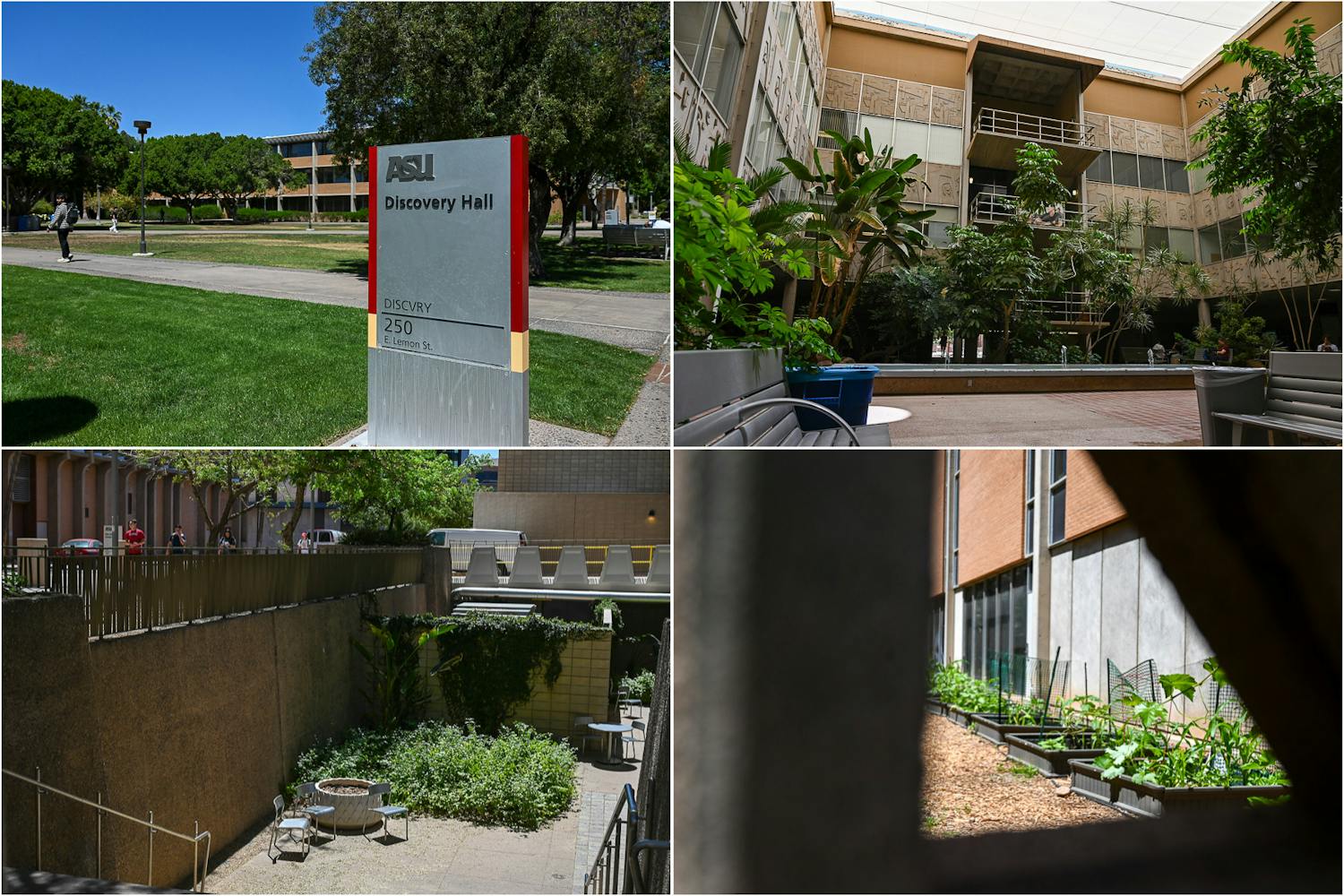Student Dreamers and DACA recipients are looking to the University for help during President-elect Donald Trump’s new administration, as they predict it will have a significant effect on immigration.
With Proposition 314 passing in Arizona and a new presidential administration, DACA recipients and Dreamers are unsure about the future of their citizenship and how they can pay for college.
Proposition 314 creates new restrictions for immigrants who are entering and functioning within the United States. It passed in the November general election with approximately 63% in favor, according to the Associated Press.
READ MORE: New crimes, old fears: How students in Arizona could be affected by immigration ballot measure
The proposition adds penalties for those entering the country at a place that is not a lawful port of entry. It also requires that one must accurately disclose their citizenship status when applying for a job or for public benefits.
Perla Sanchez, a junior studying psychology and a member of Aliento ASU, said she is most concerned with the possibility that her financial aid will get taken away under Proposition 314.
Despite Sanchez's fears the proposition will not require E-Verification for financial aid as post-secondary education does not fall under the category of 'public benefits.'
"That's a fear for me to have my financial aid taken away from me," Sanchez said. "Therefore my possibilities of continuing my education are also being stripped for me, as well as my other peers."
According to the Arizona Legislature, any attempt to avoid the E-Verify program or falsely represent citizenship will result in a misdemeanor or felony charge.
Salvador Macias, an immigration attorney, DACA recipient and ASU alum, said he expects for the country's DACA program to get removed altogether, adding an additional pressure on students paying for school.
"Removing DACA is them coming back to a fully undocumented status, meaning that paying for their education will be that much harder," Macias said. "They're already semi-limited to the scholarships that they can receive."
Students without legal status do not meet the requirements to receive federal financial aid, according to Federal Student Aid.
There are currently about 43,000 first-generation immigrant students in higher education within Arizona, according to the Higher Ed Immigration Portal.
Both Macias and Sanchez said the University should take more action to outwardly support its students without legal status.
Sanchez said while she has access to many support systems through her scholarship, the school resources for immigrants are rarely advertised on campus.
"Being more outspoken about this to other folks that are on certain scholarships would be really helpful to create this sense of togetherness and support for other students, just like me," Sanchez said.
María Blandón Orozco, a freshman studying political science, also said scholarships from the school could be more helpful for students if the University was more communicative about them.
She said the school could be more vocal by making information about the risks for students without legal status' financial aid available to all students.
"The main thing that the ASU community needs to be doing right now is being informed of the effects and the law (Proposition 314) itself ... and the opportunities that are the alternative opportunities," Blandon Orozco said.
Blandón Orozco said that the information that is released for students without legal status by the University is difficult to keep up with.
"There's a lot of information out, but since there's a lot of information, it can be sometimes overwhelming to find the specific resource that you need," Blandón Orozco said.
Sanchez said one way the University can support its immigrant students is to bring attorneys on campus to offer free consultations for immigration laws.
"It's providing students the opportunity to get legal information and knowledge, which is ultimately what our university is about," Macias said. "It's about providing that knowledge and that space for individuals to learn and to absorb."
Sanchez said even when faculty from the University reach out to her to offer help, they seem "stuck" and they aren't "100% sure what to do and how to help."
Macias and Blandón Orozco said there are ways to maximize their resources at ASU, despite it still having a lot to improve on when assisting its undocumented students.
When he was a student, Macias said he wasn't able to work because of his citizenship status and had to put his energy into finding school communities and resources that would support him.
During his time as a student, Macias found and joined Sigma Lambda Beta, a multicultural fraternity.
"They provided me that community and that support," Macias said. "In the meantime, I just had hope and faith that one day I would be able to use my degrees to be able to work."
Blandón Orozco said she uses her ASU community as an opportunity to spread helpful information and communicate with her peers.
"Make sure if you know something, share it with another peer that will probably also make good use of that information," Blandón Orozco said.
Similar to Blandón Orozco, Sanchez said that her way of finding emotional support is by reaching out to friends.
"All we can really do is just hope for the best," Sanchez said. "Remember that there's only so much we can do and only and we should only focus on what we can control each and every single day."
Editor's Note: This article was updated on Jan. 29 at 8:30 p.m. to clarify that, in Proposition 314, post-secondary education does not fall under public benefits.
Edited by George Headley, Sophia Ramirez, Tiya Talwar and Natalia Jarrett.
Reach the reporter at ehprest1@asu.edu and follow @ellis_reports on X
Like The State Press on Facebook and follow @statepress on X.
Ellis is a sophomore studying journalism and mass communication. This is her first semester with The State Press. She has also worked at Arizona PBS and Blaze Radio.




